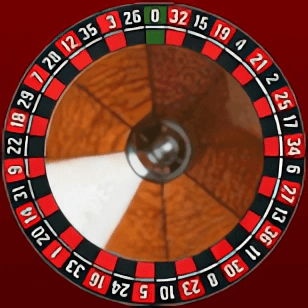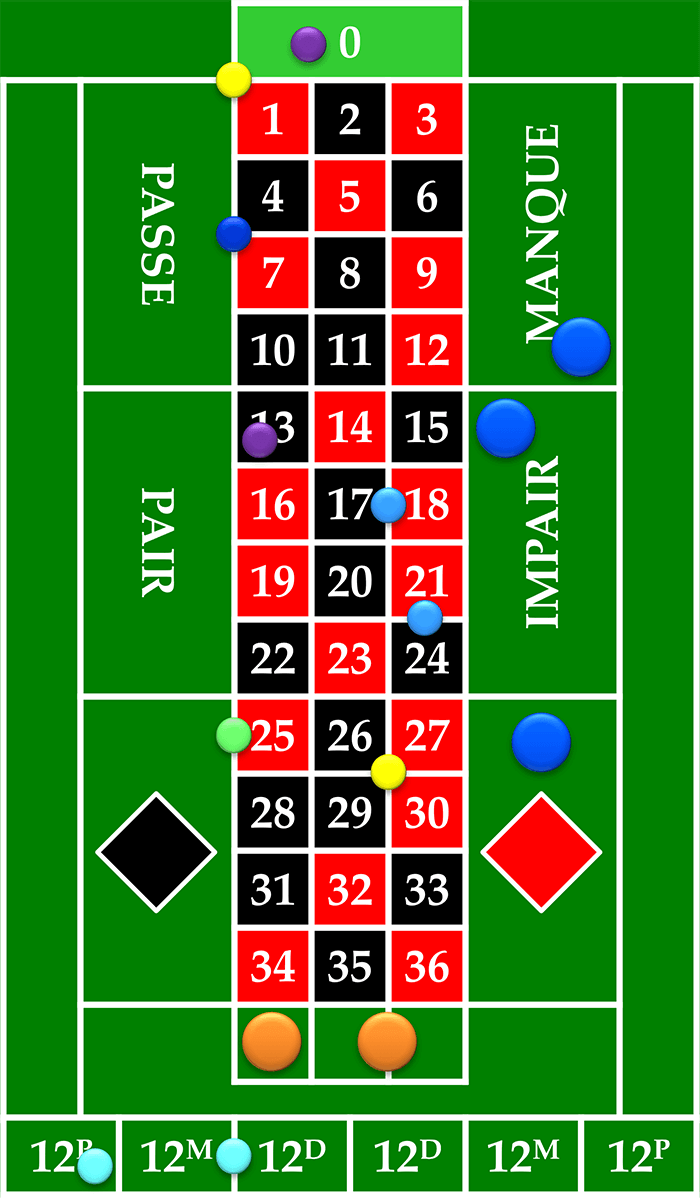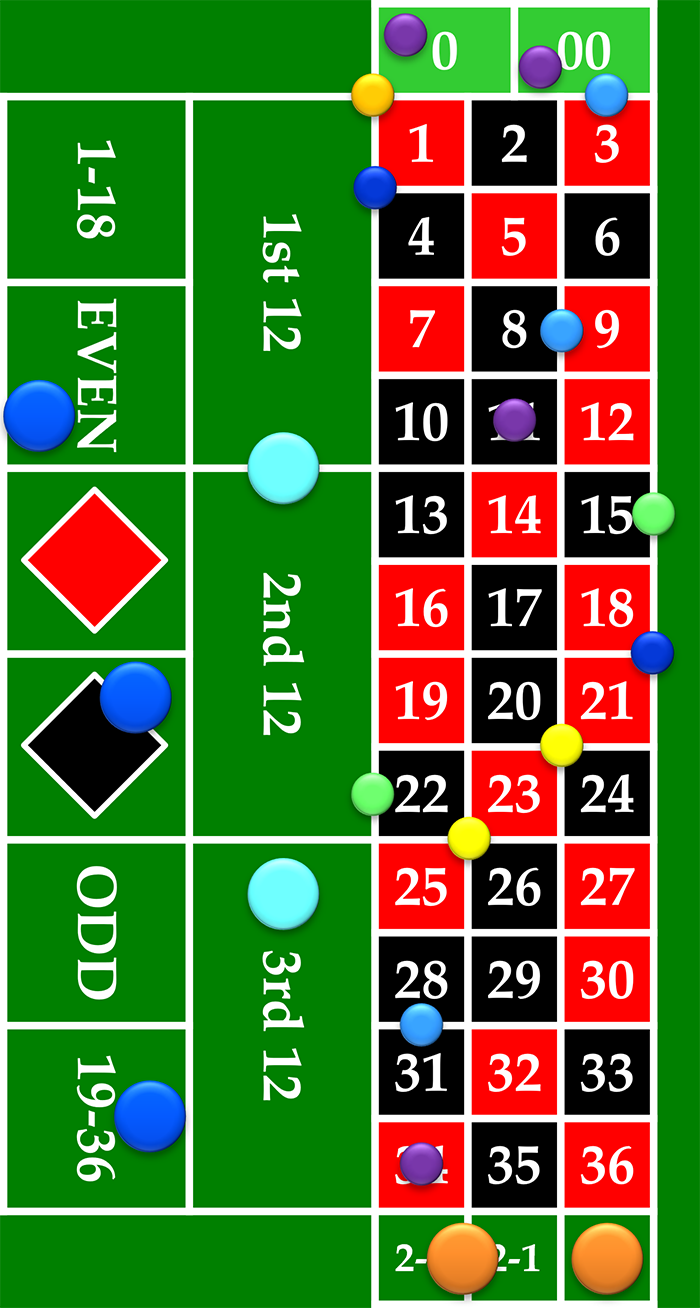Roulette Rules, Tips & Systems
Roulette is the Queen of all casino games. The name of the game comes from French and means a small wheel. Roulette was first played in Paris, France in 1796. The rules of Roulette are simple and well intelligible even for beginners. Roulette provides a great variety of bets, which makes it ideal for various betting systems. The game is very fast and truly exciting.
Roulette consists of two wheels. The big one is static, the small one is spun by a Croupier. The small wheel has 37 numbers in French Roulette and 38 numbers in American Roulette. The numbers do not follow each other ordinally. There are 18 red and 18 black numbers, zero is marked green. There is an extra (double) zero in American Roulette.

The Croupier spins the wheel, then throws in a ball in the opposite direction around a tilted circular track running around the circumference of the wheel. He or she encourages the players by the words Your bets, please! or Make your bets, gentlemen! or Faites vos jeux, messieurs! in French.
When the ball is slowing down, the Croupier announces No more bets! or Rien ne va plus! in French. When the ball loses momentum completely, it falls into the pocket of one of the numbers (→ Roulette Record Series). This is how the winning number is determined. The winning number and its color is announced by the Croupier, who puts a marker on the winning number on the Roulette layout. Then he or she removes losing bets first and pays out the winners.
How to Play Roulette? Basic Roulette Bets
There are 12 basic bets in Roulette, a few special bets and a great number of Roulette strategies. The overview of the types of bets and their payouts can be found in the figure and table below. The bet on a single number (called Straight) with the highest payout of 35:1 is one of them.
What does this payout ratio mean? If you bet $100 and were successful, your net win would be 35 × $100 = $3,500 plus the initial bet ($100). The initial bet is always returned to the player if he or she wins.
Furthermore you can bet on a combination of numbers. They are two numbers (Split), three numbers (Street), four numbers (Corner, Square) and six numbers (Line Bet).
There are also so called even-money bets in Roulette that are particularly popular. They are represented by Low (1-18) or High numbers (19-36), Red or Black numbers and Even or Odd numbers. The payout ratio is always 1:1. For example if you bet 100$ on red numbers and won, you would be paid out 100$ plus your initial bet 100$. Follow our simulation of 100,000 spins if you want to know whether the even-money bets are a good strategy to win or preserve capital in Roulette.
You can also bet on 12 numbers through Dozens (1st 1–12, 2nd 13–24 and 3rd 25–36) and Columns. The payout ratio is 2:1 in both cases. In addition you can bet on Adjacent Dozens and/or Adjacent Columns with the payout of 1:2.
All bets in Roulette can be combined in any way. The examples of placing the bets on the Roulette layout are illustrated below on the pictures for both French and American Roulette.
French Roulette
The most European casinos use the French wheel (with one zero) and French layout. However in some Anglo-Saxon countries the French wheel is combined with the American layout (without the double zero).
American Roulette
The key distinguishing feature of the American Roulette is the double zero. Since there is an extra number the house edge is higher. Therefore it is less advantageous for the players than the French Roulette.
The zeros are placed on the opposite sides of the small wheel. The American layout is also slightly different – it is one-sided (see the picture below). The bets are completely the same as in the French Roulette.
| English | French | Payout |
|---|---|---|
| Single number (Straight) | En plein | 35:1 |
| Two numbers (Split) | A cheval | 17:1 |
| Three numbers (Street) | Transversale pleine | 11:1 |
| Four numbers (Square, Corner) | En carré | 8:1 |
| Six numbers (Line bet) | Sixtaine nebo transversale simple | 5:1 |
| Dozen (1st, 2nd, 3rd) | Douzaine (premiere, moyenne, derniere) | 2:1 |
| Adjacent dozens | Douzaine à cheval | 1:2 |
| Column | Colonne | 2:1 |
| Adjacent dozens | Colonne à cheval | 1:2 |
| Red nebo Black | Rouge nebo Noire | 1:1 |
| Odd nebo Even | Impair nebo Pair | 1:1 |
| High nebo Low | Passe nebo Manque | 1:1 |
Zero in Roulette
What happens if the zero comes up? Today it is common that all even bets (high/low, red/black, odd/even) lose instantly as well as all the other bets, which have not been placed on zero.
However in some European casinos, if the zero comes up, all even bets are frozen (En Prison) and their fate is determined by the next spin. Now if the (frozen) bets win they are returned to the players, otherwise they fall to the casino. The players have another possibility called Le Partage. They can retain one half of their (frozen) bet, another one is lost.
It is the zero that gives the edge 1.35% to the house in case of even-money bets. Since you have got 19 out of 37 possibilities to lose (18 numbers + zero). As for the American Roulette, the house edge is even higher because of the double zero (18 + 0 + 00 = 20/38, 2.63%).
Due to the presence of the double zero there is one special bet in the American Roulette – the bet on five numbers 0, 00, 1, 2, 3. However, this bet is quite disadvantageous for the players as its low payout 6:1 delivers the high profit of 7.89% for the house.
House Advantage in Roulette
The odds in Roullete are, as in any other gambling game, in player's disfavor. However the Roulette odds are still relatively player-friendly. The single zero in the French Roulette gives house the edge (or the long-term profit) 2.7% when betting on numbers (and all of their combinations) and 1.35% in case of even bets (High/Low, Red/Black, Even/Odd). See the calculation based on the expected value.
The double zero in the American Roulette secures even higher profit for the casino. It is 5.3% for the bets on numbers and 2.63% for even bets.
Imagine that you feel like playing Roulette. After reading this page will you choose the French or the American Roulette? This is how the knowledge of true mathematical odds make difference between playing and gambling! The reasonable player would not play the American Roulette if there was the French Roulette in the same room.
The house edge will always turn out in the long run due to the probability theory. However in the short run there is no limit for anyone to come to the casino and be extraordinary lucky. That is due to the theory of chaos. After all each player hopes that his or her luck overcomes some mathematical disadvantage!





